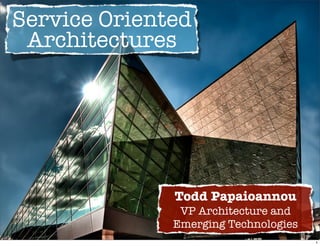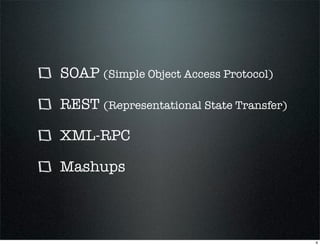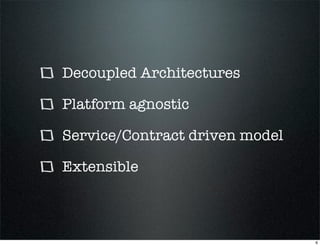Soa Primer
- 1. Service Oriented Architectures Todd Papaioannou VP Architecture and Emerging Technologies 1
- 2. What are Service Oriented Architectures? 2
- 3. ŌĆśFraid Not! 3
- 4. SOAP (Simple Object Access Protocol) REST (Representational State Transfer) XML-RPC Mashups 4
- 5. Why use build SOAs? 5
- 6. Decoupled Architectures Platform agnostic Service/Contract driven model Extensible 6
- 7. When should you use SOAs? 7
- 8. High No Experts & Strategists Complexity Knowledge Workers Front Line Users Low Many Few Decisions per Minute Yes Decision Decision Human Automation Support Intellect 8
- 9. Issues 9
- 10. Service Explosion SOA Governance Contract life cycle Complexity Interoperability 10
- 11. How does this relate to Teradata? 11
- 12. Active Active Active Events Access Load Expose Services Enterprise Service Bus Transaction Service Integration Systems Brokers Adapters BPM/ Business Data Workflow Rules Integration Active Data Warehouse from Teradata 12
- 13. How do I succeed with SOA? 13
- 14. Think! 14
- 15. You could build this Good Architecture 15
- 16. Or, you could build this Bad Architecture 16
- 17. Summary 17
- 18. SOA is a great technology if done right 18
- 19. You can drive real time value from your DW 19
- 20. You can deliver SaaS, or your own cloud services 20
- 21. Questions? 21
- 22. Roll the Photo Credits http://’¼éickr.com/photos/dcdead/2363635002/ http://www.’¼éickr.com/photos/xeophin/2181342710/ http://www.’¼éickr.com/photos/edtarwinski/454682301 http://www.’¼éickr.com/photos/liberato/171610084/ http://’¼éickr.com/photos/davelau/1227552621 22






















